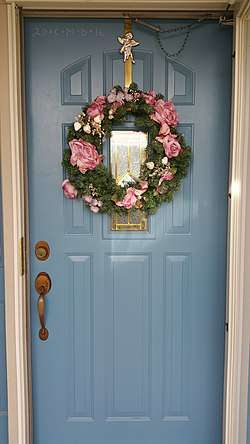Chalking the door
Chalking the door is one of the Christian Epiphanytide traditions used in order to bless one's home, as well as a Scottish custom of landlord and tenant law.

Epiphanytide
Either on Twelfth Night (5 January), the twelfth day of Christmastide and eve of the feast of the Epiphany, or on Epiphany Day (6 January) itself, many Christians (including Anglicans, Lutherans, Methodists, Presbyterians and Roman Catholics, among others) chalk their doors with a pattern such as this, "20 ✝ C ✝ M ✝ B ✝ 20", with the numbers referring "to the calendar year (20 and 20, for instance, for this year, 2020); the crosses stand for Christ; and the letters have a two-fold significance: C, M and B are the initials for the traditional names of the Magi (Caspar, Melchior and Balthasar), but they are also an abbreviation of the Latin blessing Christus mansionem benedicat, which means, May Christ bless this house."[1] Another form, for Three Kings day, is to mark the door with IIIK (the Roman numeral three followed by "K" for "Kings").
In some localities, but not in all, the chalk used to write the Epiphanytide pattern is blessed by a Christian priest or minister on Epiphany Day; Christians then take the chalk home and use it to write the pattern.[2] This Christian custom of chalking the door has a biblical precedent as the Israelites in the Old Testament marked their doors in order to be saved from death; likewise, the Epiphanytide practice serves to protect Christian homes from evil spirits until the next Epiphany Day, at which time the custom is repeated.[3] Families also perform this act because it represents the hospitality of the Holy Family to the Magi (and all Gentiles); it thus serves as a house blessing to invite the presence of God in one's home.[4]
the blessing of homes, on whose lintels are inscribed the Cross of salvation, together with the indication of the year and the initials of the three wise men (C+M+B), which can also be interpreted to mean Christus mansionem benedicat, written in blessed chalk; this custom, often accompanied by processions of children accompanied by their parents, expresses the blessing of Christ through the intercession of the three wise men and is an occasion for gathering offerings for charitable and missionary purposes.[5]
Scotland: A historical method to notify tenants of eviction
In Scotland through the mid- to late 1800s, chalking the primary door of a tenement was a way of notifying residents that they must move from their residence by a given day.[6]
By custom, leases and other similar contracts began or ended on the Scottish Term Days, which are Whitsunday and Martinmas. If a landlord wished to evict tenants in a particular tenement, the law dictated that, at the landlord's request, a burgh officer, in presence of witnesses, would chalk the primary door of the tenement forty days before Whitsunday or St. Martin's Day. The burgh officer would then record the fact that the chalking had been accomplished and this document was signed by the officer and the witnesses.[6]
The chalking indicated to tenants that they must vacate the premises by the next Term Day, when the lease expired. Tenants who failed to vacate by that date could then be evicted on six days' notice via a so-called "charge".[6][7]
References
- Essick, Amber; Essick, John Inscore (2011). "Distinctive Traditions of Epiphany" (PDF). Center for Christian Ethics at Baylor University. Retrieved 6 February 2016.
- The Encyclopedia Americana. Grolier. 1988. p. 512. ISBN 9780717201198.
- Pennick, Nigel (21 May 2015). Pagan Magic of the Northern Tradition: Customs, Rites, and Ceremonies. Inner Traditions – Bear & Company.
- Mazar, Peter (2015). To Crown the Year: Decorating the Church through the Seasons (Second ed.). LiturgyTrainingPublications. p. 241. ISBN 9781616711894.
- Congregation for Divine Worship and the Discipline of the Sacraments (December 2001). "Directory on Popular Piety and the Liturgy. Principles and Guidelines". Vatican City. Retrieved 3 January 2020.
- "CHALKING OF DOOR, CHALKING THE DOOR". Dictionary of the Scots Language / Dictionar o the Scots Leid. Scottish Language Dictionaries Ltd. 2004. Retrieved 11 June 2018.
- Bell, William (1837). "Chalking of Door". A Dictionary and Digest of the Law of Scotland: With Short Explanations of the Most Ordinary English Law Terms. p. 139. Retrieved 11 June 2018.
![]()
External links
- Epiphany Door Chalking by Christ the King Anglican Church
- An Epiphany Blessing of Homes and Chalking the Door by Discipleship Ministries of The United Methodist Church
- Chalking the Door: An Epiphany House Blessing 2016 by the Roman Catholic Order of Carmelites